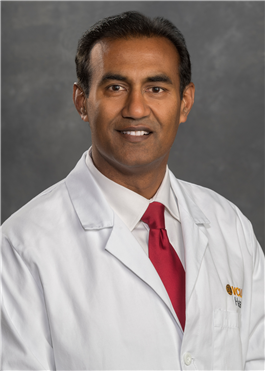
Vipul Patel, MD
Specialty
Department
Internal Medicine
Locations
1200 E. Marshall Street
Richmond, VA 23219
Get Directions
1001 E. Leigh Street
Richmond, VA 23219
Get Directions
Education
Medical School
The M. S. University of Baroda Medical College
Internship
SUNY Downstate Medical Center
Residency
SUNY Downstate Medical Center|The M. S. University of Baroda Medical College
Fellowship
Norton Thoracic Institute at St. Joseph's Hospital and Medical Center|University of Southern California
Biography
A doctor helping patients breathe easier
Vipul Patel, M.D., gives his patients his full attention during their conversations about how he can help put them on a path to healthier lungs.
“Listening to the patient is the most important thing,” says Patel, medical director of lung transplantation at VCU Health Hume-Lee Transplant Center and a faculty member in the Division of Pulmonary Disease and Critical Care Medicine in the Department of Internal Medicine. “Valuing the patient and the concerns they have from their point of view — that’s the foundation of patient care.”
At Hume-Lee, Patel leads a program offering specialized transplant care for people coping with the daily challenges of seriously ill lungs.
The lung program at the Richmond-based center fills a gap in lung transplant care, bringing it closer to home for some patients compared to programs in other Virginia cities and surrounding states, he says. Under Patel’s direction, Hume-Lee is expected to perform 10-15 transplants in the program’s first year with an anticipated yearly growth of 20%.
Patel lives by the words that his grandmother used to say: “Knowledge brings humility and politeness.” Living by that creed, Patel brings a down-to-earth approach to his medical practice.
Although he’ll order any CT scans, echocardiograms, and other tests needed, he prefers to use a stethoscope to listen to a patient’s lungs for clues about their pulmonary health. He doesn’t want to be distracted by note-taking when meeting patients because he wants to focus on what they’re telling him.
“As a patient, when I go to the doctor and the doctor is not looking at me and is writing notes as I'm being interviewed…I don't like that,” Patel says. “So I don't do that with my patients.”
Patel treats patients who have end stage lung disease, including cystic fibrosis, chronic obstructive pulmonary disease (COPD), pulmonary hypertension, sarcoidosis, and other conditions. As an irreversible lung disease progresses, it severely impacts the patient’s quality of life and their life expectancy. A transplant of one or more lungs is often a last resort to restoring their health, he says.
“They are dependent on receiving oxygen. They are not able to walk longer distances. They are homebound,” Patel says. “With a lung transplant, we have seen patients go back to living their normal life. That means going shopping, going hiking, going to the mountains.”
For lung transplant patients, their journey to receiving new lungs starts with an evaluation that Patel and a team of health care professionals perform before the transplant. That collaboration includes consultations with surgeons, social workers, psychiatrists, nurses, and others. But Patel always knows the patient is a central part of that team and is the final decision-maker about what treat they undergo.
Following a transplant, he works to ensure the patient’s body doesn’t reject their new lung (or lungs) and that infections don’t arise in the newly transplanted organs.
He notes that can be a tricky balance to strike because the lungs are constantly exposed to potential infections from airborne viruses and bacteria. After a life-changing lung transplant, Patel says patients need to follow a detailed treatment regimen.
“You’re getting rid of one disease, but you can experience lung transplant complications,” he says. “You have to take medications regularly. You have to see the doctor regularly. You have to go through a series of tests to make sure your lungs stay in good health.”
Advice to Patients
“Get a good understanding of your disease and know what your options are. You are the driver of your care. You have to decide the next steps based on that knowledge, and I'm here to provide you with the knowledge to make the right decision. I'm here to help guide you whatever your decision is.”
Research Interests
Extracorporeal membrane oxygenation for patients awaiting lung transplants.


 Back to search results
Back to search results